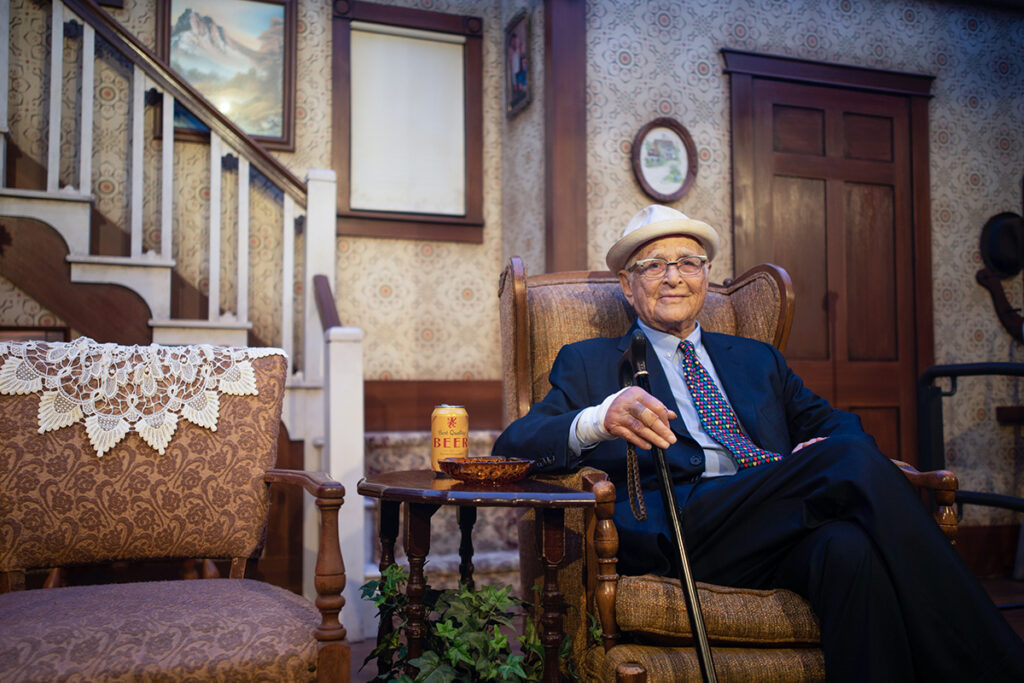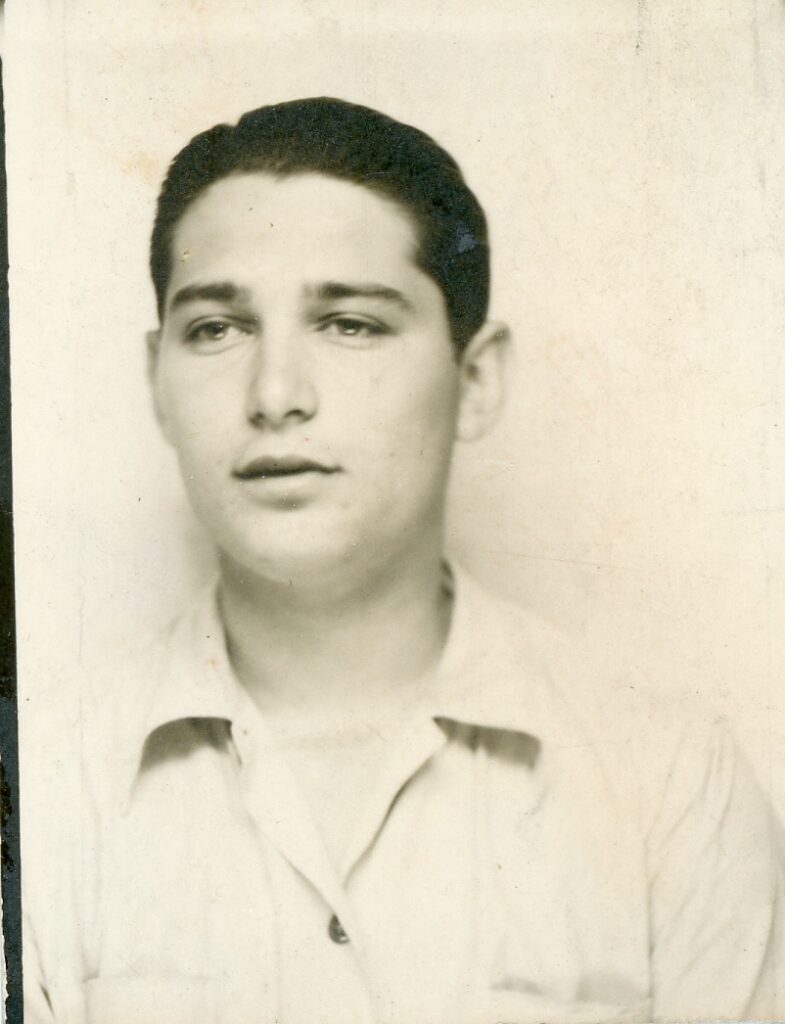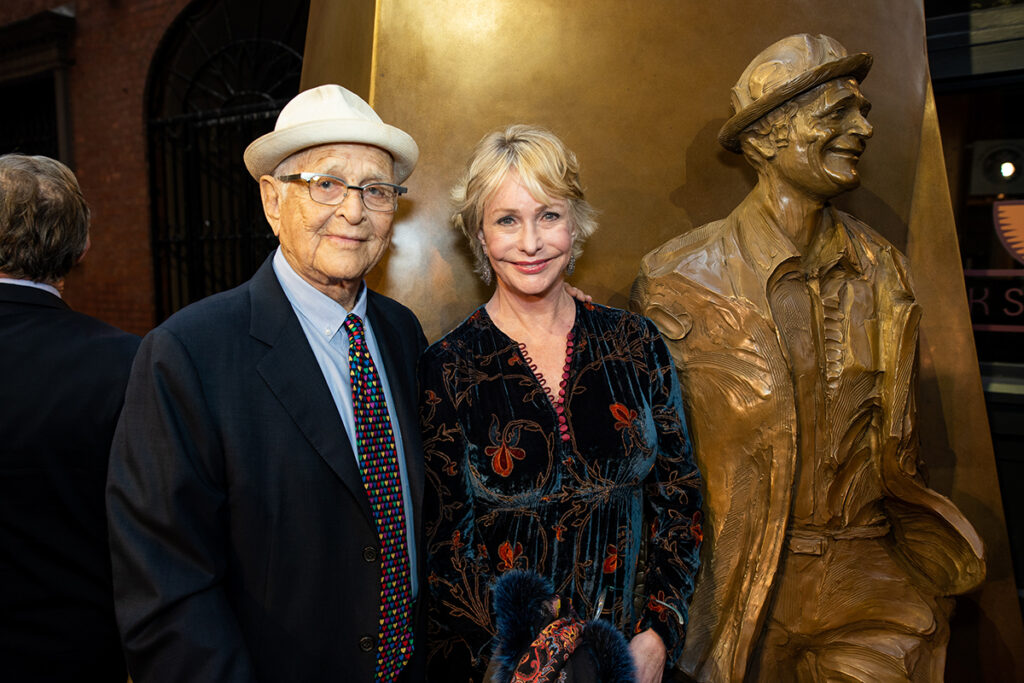Remembering Norman Lear ’44, a Titan of Comedy

The Emerson community today is remembering Norman Lear ’44, LHD ‘68, who, over the course of his six-decade career, changed how Americans saw television and themselves through his revolutionary sitcoms and his political activism.
He died Tuesday, Dec. 5, surrounded by family. He was 101.
As the creator of some of the most groundbreaking TV shows of the 1970s and ‘80s, Lear used his comedies to portray American families not as white, stereotypical specimens of the “American Dream,” but as people with real struggles, foibles, bigotries, and love.
“Through Lear’s subtle influence, America became more liberal, more tolerant, a better country,” the Hollywood Foreign Press Association said on awarding Lear the Carol Burnett Award in 2021.
Though service in World War II kept him from completing his Emerson education, Lear embodied the Emerson ideal of telling stories that celebrate diversity, and he never forgot his alma mater.
In 2018, he started an Emerson scholarship in his name that allows talented students from first-generation, underrepresented, and underserved backgrounds to pursue their dream of writing for film, TV, theater, or other genres. In October of that year, he visited Emerson’s Boston campus for “Norman Lear Day,” which included the unveiling of a statue in his likeness, located in the Boylston Place alley.
“When one thinks of Emerson’s substantial footprint in comedy, you can’t help but think of Norman Lear,” said Martie Cook, Professor and Founding Director of Emerson’s Center for Comedic Arts. “His work was fearless and groundbreaking. He wasn’t afraid to tackle challenging issues. He brought a brave new light to serious subjects rooted in the humanity of his richly drawn characters. Mr. Lear was a comedic genius of the highest order. He understood comedy, he lived comedy, he breathed comedy. and we are all better because of it.”
In 2020, Lear joined Trustee and producer Kevin Bright ‘76 for a special bonus episode of Season 1 of Emerson’s Making It Big in 30 Minutes podcast.
“In these dark times, the world has lost one of its brightest lights. A life well lived, a friend I will truly miss,” Bright said.
Also in 2020, he participated in Emerson Prof. Tripp Whetsell’s class on Lear and his influence on American entertainment, taking questions from students.
“Our students were incredibly fortunate to learn from Lear directly when he visited the class via Zoom and imparted his wisdom and vision. And Mr. Lear, in turn, was able to see his enduring impact through the fresh young eyes of our students as they presented their papers in tribute to his amazing life and legacy,” Cook said.
Lear also talked about his time at Emerson and how laughter can be used to promote social change in a 2005 interview for the College’s American Comedy Archives.
Lear, a native of Hartford, Connecticut, came to Emerson in 1940 on a scholarship he won in an American Legion oratory competition. Lear gave a speech entitled “The Constitution and Me.”
“The reason for that title was I was Jewish, and I had learned there were people who hated people because of their religion … I wondered if the Constitution wasn’t a little more precious to me than someone who didn’t need its protection,” Lear told Emerson Today in a 2016 interview.

One of “only about seven guys” in the Class of 1944, Lear studied drama with professor Gertrude Binley Kay. “She had a Back Bay name… and she talked like this,” he said, mimicking a high-pitched Brahmin accent. “She wore huge hats.”
Lear was in Kay’s class when he heard that Pearl Harbor had been bombed on December 7, 1941. The following September, he enlisted in the Army, flying 52 combat missions in Europe and winning the Air Medal with four oak leaf clusters.
Though he wouldn’t return to an Emerson classroom (as a student), the College would award him an Honorary Doctorate of Humane Letters in 1968.
Following his service, Lear moved to Los Angeles, where he began selling sketches to TV comedy teams in the 1950s.
Lear worked his way up through the writers’ ranks, eventually creating a string of sitcoms that tackled tough societal issues and practically defined television in the 1970s and early 1980s: All in the Family, Sanford and Son, The Jeffersons, Good Times, Maude, and One Day at a Time.
“As a child of the ‘70s, I grew up watching Norman’s shows on TV. I was definitely shaped by the characters and the stories I watched, and I remember lots of laughter, night after night,” said Emerson’s President, Jay Bernhardt. “Norman Lear personified what Emersonians strive to do by changing the world through his stories and his voice.”
Lear became politically active during the 1970s as well, and in 1981, he formed People for the American Way to counter right-wing extremism and promote “freedom, equality, opportunity, and justice for all.”
In 2001, Lear became the owner of one of the extant copies of the Declaration of Independence, called a Dunlap broadside. That July 4, he and actor/writer/producer Rob Reiner staged a dramatic reading of the document at Philadelphia’s Independence Hall, with readers including Winona Ryder, Renee Zellweger, and Morgan Freeman. In 2004, he took the Declaration on the road so that people across the country could feel connected to the nation’s founding principles.
One of the most prolific creatives in the industry, Lear had 45 writing credits and 65 producing credits to his name, including TV shows, TV specials, TV movies, documentaries, and feature films, including The Princess Bride (1987) and Fried Green Tomatoes (1991).
He kept working throughout his 90s, introducing new generations to his vision and humor and embracing new formats, through reboots and recasts of his classic shows. He executive produced One Day at a Time, reimagined with a Cuban-American family, which streamed on Netflix from 2017-2019 and was picked up by Pop in its last season.

In 2019, Lear became the oldest person ever to win an Emmy Award when he took Outstanding Variety Special (Live) as executive producer of Live in Front of a Studio Audience: Norman Lear’s All in the Family and The Jeffersons, which recreated episodes of the sitcoms with new casts. The following year, he repeated his win for Live in Front of a Studio Audience: All in the Family and Good Times.
Lear has six Emmys, 16 nominations, and was inducted into the Emmys Hall of Fame in 1984. For his contributions to television and culture, he was honored by the Kennedy Center and received a Peabody Award, both in 2017, and was presented with the Carol Burnett Award for “outstanding contributions to the television medium” at the 2021 Golden Globe Awards, held virtually due to the pandemic.
He also holds four Writers Guild of America Awards, an American Comedy Award, a GLAAD Media Lifetime Achievement Award, an International Documentary Association Amicus Award, an International Emmy, and a Television Critics Association Award, among many others.
Lear executive produced an American Masters documentary, Rita Moreno: Just a Girl Who Decided to Go for It, and at the time of his death, had executive produced two television series that were in post-production or completed, two in production, and two in pre-production or development, according to imdb. Among those were reboots of his classic sitcoms Good Times and Mary Hartman, Mary Hartman.
In 2014, Lear published his memoir, Even This I Get to Experience, and in 2016 was the subject of a documentary, Norman Lear: Just Another Version of You, edited by fellow Emerson alum JD Marlow ’08.
“Norman was obviously an incredibly special human being, and having the privilege of helping tell his story was one of the most memorable moments of my career as an editor,” Marlow said. “I will never forget my wife and I sitting directly behind him at the Eccles Theater during our Sundance premiere in 2016, and watching him wipe tears off his face during parts of that screening.
“He was so genuine and heartfelt in every aspect of his life. And in talking with him at that time, he was just so grateful and appreciative of what we had done with the film. It obviously meant so much to him, but it also meant a lot to me that he felt that way,” Marlow added.
Lear is survived by his wife, Lyn; and six children: Ellen, Kate, Maggie, Benjamin, and twins Madelaine and Brianna.
Categories